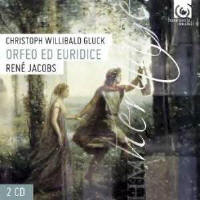Texte paru dans: / Appeared in: |
|
|
Outil de traduction (Très approximatif) |
|
|
Reviewer:
Alan
Blyth Orfeo comes in many guises. There is Gluck's original Italian version, composed for Vienna in 1762, his adjusted version for Parma in 1769, his French revision of 1774 for Paris, and then the numerous, posthumous compromise texts Berlioz's is only the most widely known of them - that seek the best of both worlds by incorporating sections of the French version within the framework of the Italian (there is even a little known version by Liszt, for which his tone-poem Orpheus was composed as overture). The present version, like the three listed above , is 'pure' Italian, and although this means forgoing such famous and affecting music as the Dance of the Blessed Spirits, 'Cet asile' and the enhanced ending to 'Che faro ', as well as the big D minor Dance of the Furies, it does offer a much more concentrated experience, better attuned to the aesthetics of Gluck and his librettist Ranieri de' Calzabigi. The tone of the performance here is set by the highly energetic overture, with its forceful accents and its sharply defined textures and dynamics. René Jacobs takes pains throughout to give a clear yet also rich quality to Gluck's often very original orchestral textures and to shape his phrases with style and with due awareness of the omnipresence of dance. The dances themselves, which often express so poignantly an emotion too deep for words, are delicately poised, and curiously both subdued and strongly characterised. (But I fail to understand why he introduces pizzicato cadences to some of the recitatives: a false note.) It is however the singer of Orpheus, even more than the conductor, who gives character to a performance of this work. Often nowadays - as in all the versions of the Viennese original cited above - it is sung by a countertenor in preference to the contralto long favoured in the role, which was of course composed for a castrato, Gaetano Guadagni. Berlioz's version was written for Pauline Viardot; other great interpreters have been Kathleen Ferrier and Janet Baker, and Anne Sofie von Otter has recorded it. The arguments in favour of a woman's voice need to be taken seriously, the central ones residing in the 'sexlessness' of the countertenor voice; against that one may set the faintly maternal overtones of the contralto. Which better suits the semi-divine Orpheus? Of course, whatever the voice, it ultimately depends on the artistry of the singer. Bernarda Fink, whom I have long admired in Handel and other 18th-century music, sings the role here very beautifully and quite unaffectedly. Her great strength lies in her smooth, natural and very even tone and her command of line. The evenness is especially telling in the strofe in Act I, the three verses with their intermediate recitatives gathering in intensity towards the passionate recitative that draws Amore down to offer Orpheus his venture into the underworld . I have heard pleas to the Furies more impassioned than Fink's, but 'Deh placatevi' itself is compelling, and 'Che puro ciel" is almost sensuously sung. The music that ends Act 2 , at the lovers reunion, is taken faster than usual and this flowing tempo effectively conveys the sense of calm joy. I also particularly liked the measured tempo for 'Che faro', which gives Fink space for a quietly rapt, unexaggerated account of it. Maria Cristina Kiehr gives a neatly poised, refined account of Amore's music and Veronica Cangemi makes a telling Euridice, quite full in voice and firm in tone, giving proper weight to her words and duly passionate in 'Che fiero momento'. This is, to my mind, the best version of the Italian original with a woman as Orpheus and can be recommended without hesitation to anyone who prefers to avoid the male alto voice. Of the listed versions, the first has René Jacobs himself as Orpheus, which offers an interesting comparison with the new set. My own choice lies between Michael Chance's beautifully sung version under Frieder Bernius and Derek Lee Ragin's ardent impersonation in John Eliot Gardiner's, broader and rather more traditional approach; both are revealing accounts, in quite different ways, of this very special work. |
|
|
Sélectionnez votre pays et votre devise en
accédant au site |
|
|
|
|
|
Cliquez l'un ou l'autre
bouton pour découvrir bien d'autres critiques de CD |
|



